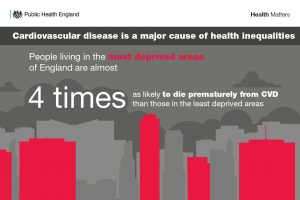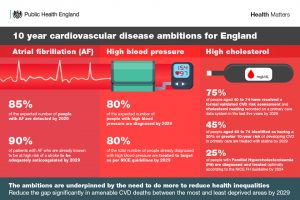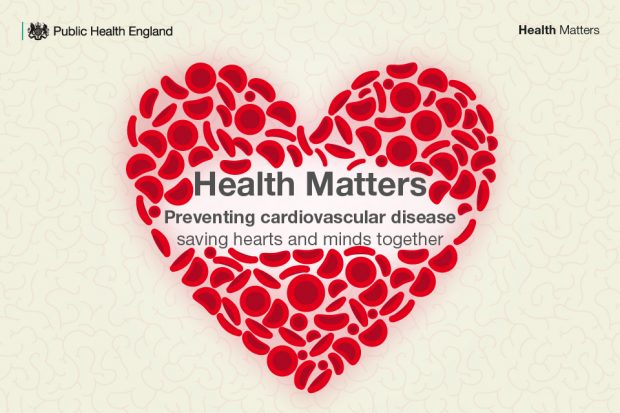Cardiovascular disease: A major cause of health inequalities
Cardiovascular disease (CVD) remains the leading cause of premature mortality in England, and the rate of improvement seen in recent years has slowed. It is also one of the conditions most strongly associated with health inequalities, with people living in England’s most deprived areas being almost four times more likely to die prematurely of CVD than those in the least deprived area.

As well as living, on average, shorter lives, the evidence is clear that the more deprived communities of our country are affected by a range of conditions that significantly impact on their quality of life. For example, those in the most deprived communities are 30% more likely to have high blood pressure, which is the biggest single risk factor for heart attack and stroke.
Pledging a commitment to reducing CVD inequalities
Commitments to tackling CVD inequalities have been made repeatedly over the past two decades. However, over the same period of time, the significant gap in CVD-related mortality and morbidity between our most and least deprived communities has not narrowed at all. There are a multitude of reasons for this, several of which are complex and difficult to influence, including many of the wider determinants of health. Despite this, there is much to be optimistic about.
The recently published NHS Long Term Plan provides a platform to transform the way we tackle CVD in England and pledges a rejuvenated call to address CVD inequalities. It has set a major ambition of preventing 150,000 heart attacks, strokes and dementia cases over the next 10 years. To help achieve this, the new GP contract makes a clear resourcing commitment to CVD prevention. There is also a clear strategic intent and a requirement for Integrated Care Systems to take forward the aspirations for prevention, as part of local transformation programmes.
To complement this, PHE, NHS England and a coalition of system partners – known as the National CVD Prevention System Leadership Forum – launched the first ever national ambitions to improve the detection and management of the three major conditions that cause CVD: atrial fibrillation, high blood pressure and high cholesterol. The ambitions also underpinned the commitment to reducing CVD-related health inequalities.
Launched at PHE’s annual CVD Prevention Conference last week, these ambitions are set out in the latest edition of Health Matters.

What will help us in achieving these ambitions is our growing knowledge around the complexities of CVD inequalities, and our willingness to tackle them with informed principles gleaned from theories such as Systems Leadership.
We know what works in relation to secondary prevention of CVD and have scores of academic clinical evidence, as well as learnings from programmes such as Bradford Healthy Hearts, the British Heart Foundation, and case studies of best practice.
The last six years of the local authority-commissioned NHS Health Check also provide us with an established mechanism and invaluable local understanding for delivering secondary CVD prevention, targeted at those most in need.
An example of best practice: Medway Council
James Williams is Director of Public Health for Medway, an area with particularly high levels of CVD inequalities. The number of people dying prematurely from CVD was 53.5 per 100,000 of the population between 2014 and 2016. This is higher than regionally in the South East at 38.4 and nationally at 46.7 per 100,000. Nonetheless, these inequalities are being tackled effectively in a number of different ways.
As Director of Public Health for Medway, I am often asked about the major issues impacting on my population and what is being done about them. Improving population outcomes requires a focus on tackling the causes of the causes, or as Sir Michael Marmot calls them, the “social determinants of health”.
In Kent and Medway, we follow Marmot’s Principles of proportionate universalism whereby more needs to be offered to those who are at greatest risk, particularly considering the impact CVD has on increasing inequalities. We offer outreach programmes to enhance the uptake of NHS Health Checks in our more disadvantaged communities, which involves going to working men’s clubs, shopping centres and bespoke wellness shops located on our highstreets – all linked to our colleagues in primary care.
We are also tackling the behaviours that increase people’s risk of developing CVD. We are delivering smoking interventions at scale with a specific focus on our harder to reach communities and working to reduce smoking in pregnancy. Furthermore, we are engaging with risk groups in a targeted way to address obesity. For example, we have worked with the Football Association to launch ‘Man versus Fat’, an initiative which has seen particular success in Medway with local participants having broken the national record for the most weight lost in one season.
We have been able to get commitment to prioritise prevention and support the delivery of our prevention action plan with key CVD reduction initiatives, from the Kent and Medway STP Clinical and Professional Board, Kent and Medway STP Programme Board, and Joint Kent and Medway Health and Wellbeing Board. Together with the framework of the NHS Long Term Plan and PHE’s CVD prevention ambitions, we will continue our efforts to redress the inequalities attributable to CVD.
Visit the Health Matters area of GOV.UK or sign up to receive the latest updates through our e-bulletin. If you found this blog helpful, you can read other Health Matters blogs.


1 comment
Comment by Dorothy posted on
I wish all the Public Health Directors could follow the example of what James Williams who is Director of Public Jealth for Medway has done and is doing to help his local people. Well done Sir James Williams.